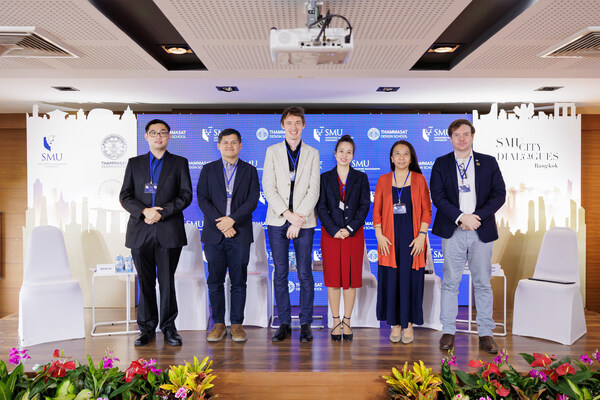 |
BANGKOK, May 14, 2024 /PRNewswire/ -- Singapore Management University (SMU), together with Thailand's Thammasat University (TU) hosted a forum, "SMU City Dialogues Bangkok: Growing Asia's Secondary Cities – Challenges and Opportunities" on 9 May 2024.

From left to right- Dr Adrian Lo, Dr Adiwan F. Aritenang, Associate Professor Orlando Woods, Dr Tu Anh Trinh, Dr Rattikarn Khambud, and Mr Clinton Moore
The SMU City Dialogues series convenes a curated assembly of leaders from industry, government, and academia for candid and uninhibited discussions with the aim of advancing innovative solutions to tackle key challenges facing the world today, aimed at influencing policy and industry.
At the forum held at Thammasat University, panelists explored lessons that can be learnt from a shared understanding of the challenges and opportunities of developing secondary or 'middleweight' cities in Southeast Asia, to foster the sustainable growth of cities.
Keynote speaker, Mr Riccardo Maroso, Programme Manager, United Nations Human Settlement Programme (UN-Habitat), Bangkok Programme Office, Regional Office for Asia and the Pacific (ROAP) shared key insights from the ASEAN Sustainable Urbanisation Strategy (ASUS), highlighting that by 2030, there would be 70 million additional urban dwellers in ASEAN cities, with 56% of its entire population urbanised. The main demographic and economic growth across ASEAN is happening in smaller 'middleweight' urban areas, providing the opportunity for balanced urban and spatial development and regional integration. Nevertheless, secondary cities face several challenges and will require strategic support and investments to plan and manage sustainable development and provide quality services and livelihood opportunities for all their residents. Mr Maroso concludes that the attention of key international organizations such as ASEAN and the UN, the increasing research and dialogues within academia and the growing efforts from countries across ASEAN are positive steps toward an integrated approach to policy development and action for a sustainable urban development that leaves no one and no places behind.
Moderated by Dr Adrian Lo, Director, Urban Design & Development International Programme, Faculty of Architecture & Planning, Thammasat University (Thailand), the regional panel included experts in the field - Dr Adiwan F. Aritenang, Director, Postgraduate Programme, Urban & Regional Planning Programme, Institut Teknologi Bandung (Indonesia), Mr Clinton Moore, United Nations Economic and Social Commission for Asia and the Pacific (UNESCAP) (Thailand), Associate Professor Orlando Woods, Director, SMU Urban Institute (Singapore), Dr Rattikarn Khambud, Department of Public Works & Town & Country Planning, Ministry of Interior (Thailand), and Dr Tu Anh Trinh, Director, Institute of Smart City & Management, University of Economics Ho Chi Minh City (Vietnam).
The consensus from the panel was that there is no standard way of classifying cities into primary or secondary categories, as cities differ from each other in every country in scale and scope. They agreed that secondary cities tend to receive less support, and so may lack the capacity and knowledge to develop their potential fully in order to progress.
Mr Moore said, "Resourcing is different from a capital city and a small city, the level of thinking, the type of talent the city attracts are different, and all these go into the mix of how well the city can function and govern and garner support……From a UN point of view, we are very keen to put national frameworks across the region. Regional buy-in is important. The work that ASEAN is doing is very important to drive and promote sustainable urbanisation in secondary cities."
He added that the future of cities and countries depends on the plans now. Research on secondary cities is gaining more traction and seeing more funding and documents. It is encouraging but we need the future generation to take that onboard. To this, Dr Aritenang adds that leaders such as universities and institutions need to initiate change in the mindsets of citizens to effect necessary change.
Assoc Prof Woods also shared that all cities are increasingly becoming valuable to the private sector because of the data they produce. Secondary cities can also be valuable to the right kinds of investors.
In his closing speech, Asst Prof Asan Suwanarit, Dean of Thammasat University's Faculty of Architecture & Planning (also known as Thammasat Design School) said, "We cannot look at these secondary cities in isolation. We need to look at them as a network with other cities and the relationship of the non-physical aspects as well, such as economic, social, and cultural, that can cause environmental issues. That will give a more comprehensive understanding of the relationship between cities, of how each city can complement and impact each other."



